| SHADOWS ON THE WALL | REVIEWS | NEWS | FESTIVAL | AWARDS | Q&A | ABOUT | TALKBACK | |||||
 Shadows off the beaten path Shadows off the beaten pathIndies, foreigns, docs, revivals and shorts...
On this page:
THE CHAMBERMAID |
DUST |
LABEL ME
| |||||
| See also: SHADOWS FILM FESTIVAL | Last update 21.Jul.19 | |||||
|
The Chambermaid La Camarista Review by Rich Cline | 
| |||||
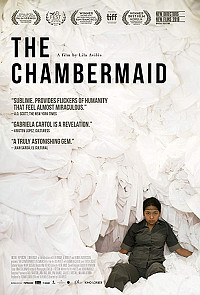 dir Lila Aviles prd Tatiana Graullera, Lila Aviles scr Lila Aviles, Juan Carlos Marquez with Gabriela Cartol, Teresa Sanchez, Agustina Quinci, Jose Manuel Ramirez Gloria, Marisa Villaruel, Elizabeth Sotelo, Alan Uribe Villaruel, Clementina Guadarrama, Elvia Rosales Zarate, Federico Tello, Perla Matias, Alejandro Moreno release US Mar.19 ndnf, UK 26.Jul.19 18/Mexico 1h42 TORONTO FILM FEST  |
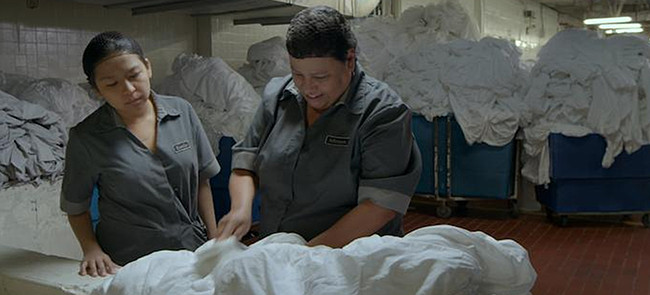 This understated Mexican drama explores the lives of those who work behind the scenes: cleaners, chefs, maintenance workers and administrators who keep a luxury hotel running. Filmmaker Lila Aviles follows one young woman with an almost documentary attention to the tiniest detail. As not much happens, the film feels overlong, but it's made to a very high standard, revealing a world few moviegoers have experienced. In a high-rise five-star hotel, 24-year-old Eve (Cartol) silently goes through her cleaning routine when she discovers a guest asleep on the floor under the bed. In other rooms, she's distracted by personal items, finds things left behind and has unexpected encounters with guests. In her spare time, Eve calls home to speak to her her 4-year-old son, and she's also studying to get her high school diploma. Also in the class is her lively colleague Minitoy (Sanchez), who tries to introduce Eve to other employees, but she's nervous about opening up. For good reason. Never leaving the hotel, the still, focussed camerawork offers a fly-on-the-wall authenticity, allowing a quiet narrative to emerge organically. A model employee, Eve is first on the list to claim a red dress she found in a room, but wonders if she'll get either the dress or a long-promised promotion. There are several moments of offhanded energy and humour along the way, from a distracted first-time mother (Quinci) in need of help to Minitoy's electric-shock game. And as the film continues, some of Eve's routines take on extra meaning. Cartol is completely natural in the role. Often near overwhelming mountains of linens, her place in society's pecking order is clear, but her reaction to romantic overtures from a window cleaner (Ramirez) shows that she's not quite at the bottom. As Minitoy, Sanchez injects some playful energy into the film. She's envious of Eve's higher status, assigned to a higher floor, and seems perhaps a bit too interested in bringing Eve out of her shell. While this may seem meandering and aimless, Aviles is quietly revealing social issues in each scene. This is a bracingly observant look at a class system no one admits exists, from Eve's daily struggle to the wealthy guests who think their lives are full of stress. Scenes are loaded with insight, revealing how subservient roles remove a person's individuality. In this sense, watching Eve express herself is fascinating, finding hope in a seemingly hopeless situation.
| ||||
|
Dust Dòst Review by Rich Cline | 
| |||||
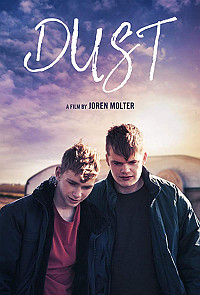 dir Joren Molter scr Britt Snel prd Floor Onrust with Henk-Jan Doornbosch, Liam Feikens, Yamila Huft, Maurins Boonstra, Jack Jansen, Jochem Smit, Benthe Horlings, Anouk Johannes, Rene Jonkman, Ruud Poiesz, Robbin Nieborg, Jarnick Ramm release Ned 27.Oct.18, UK 22.Jul.19 18/Netherlands 41m |
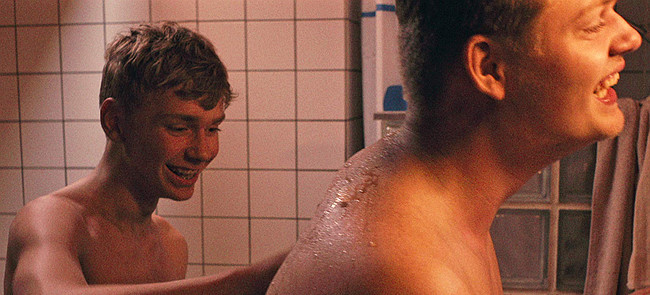 Bristling with earthy energy, this coming-of-age drama sharply catches the lively personalities of teens in a rural setting. With a running time of under an hour, it feels like a feature, as writer Britt Snel and director Joren Molter add depth to characters, bringing out underlying themes that are easy to identify with. They also never shy away from the hard edges of the issue, challenging the audience to see the true nature of bravery and cowardice. Working on a farm, teens Alko and Bjorn (Doornbosch and Feikens) are best friends trying to make choices for the future. After work, they wash off the dirt together and talk about their insecurities about girls. Under the bravado, all of the teens they party with are nervously teasing each other about their "first time". And there's also Lien (Horlings), who hires herself out offering first kisses. Then Alko meets Marie (Huft), a girl he'd like to kiss. But it's also clear that Bjorn has feelings for Alko, putting a strain on their friendship. The filmmakers capture life in this countryside setting with clever textures, from the muddy fields where these teens work to their playful antics together. Bjorn and Marie have a date that involves buckets of sweets and some sexual exploration, although Marie wants to wait until she's legal at 16. "Do you know Marie's birthday?" Alko asks Bjorn immediately afterwards. Most conversations skirt around the central issues, although these young people are so curious and open that they are willing to talk when they need to. The naturalistic filmmaking draws remarkably raw, truthful performances from the sparky young cast. At the centre, Feikens and Doornbosch are a terrific duo, generating strong chemistry even as the dynamic between them begins to shift. Felkens captures Bjorn's quiet yearning beautifully, without any sentimentality, and Doornbosch plays Alko's response with remarkable nuance. As the other kids, the surrounding cast is bursting with personality, especially in scenes of the group's drunken revelry. The story's most fascinating angle is Alko's complex journey, as he struggles to understand the nature of what's happening around him. There's a surprising amount of shading within both of these central characters, and their distinct coming-of-age journeys play out with understanding and sensitivity. Issues of peer pressure, bullying, homophobia and unrequited romance swirl potently around each scene in this little drama, pushing a friendship to the brink, and then some. Some of this might feel over-the-top, but the honesty is provocative and important.
| ||||
|
Label Me Review by Rich Cline | 
| |||||
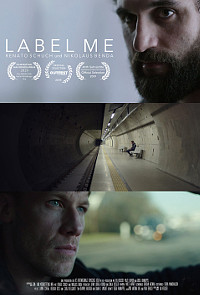 dir-scr Kai Kreuser prd Sonja Kessler, Jenny Lorenz-Kreindl with Renato Schuch, Nikolaus Benda, Lea Fleck, Gioele Viola, Georg Paluza, Timur Uelker, Cem Aydin, Christoph Wielinger, Damon Zolfaghari, Emanuel Weber, Thomas Balou Martin, Jogi Kaiser release Ger Jan.19 mofs, US Jul.19 off 19/Germany 1h00   |
 Dark and thoughtful, this German drama is beautifully understated as it explores the complexities of identity for an immigrant who is afraid to let anyone see who he really is. Within a brief running time, writer-director Kai Kreuser maintains a tight focus on the shifting balance of power between two central characters, wasting no time on melodrama or the usual gyrations of plot structure. Working as a prostitute, beardy Syrian refugee Waseem (Schuch) has strict rules for his male clients, refusing to admit that he's gay. Lars (Benda) is fine with this, as long as they can spend time together. A repeat customer, Lars begins to ask about Waseem's background, his 18 months in Germany and their sexual histories. Lars also takes Waseem to a gay club as a provocation. Indeed, it creates a new level of honesty between them as they begin to find a way of interacting that's more truthful and open. But it's not easy. Strikingly shot by Malte Hafner in eye-catching locations, the film has a fine sense of light and shadow. Waseem doesn't speak German, so conversations are in English, which adds to his connection with Lars. It's seems obvious that Waseem and Lars are growing closer, but Waseem struggles to see this as an option. And he has his own scenes too, including other clients and some charged situations in his shelter. Both actors are strongly engaging. Schuch bares Waseem's soul and body on-camera, visibly shaken as he grapples with his own thoughts and feelings. Benda is equally naked, as Lars is powerfully drawn to Waseem on a much deeper level than he expected. Their scenes together are fascinating, as each gets the upper hand on the other, offering just a bit of playfulness underneath the much more serious themes on the surface. And as they begin to open up to each other, the walls between them begin to weaken. There's a remarkable sense that Waseem has been so conditioned that he needs to be heterosexual that he can't even admit to himself that other yearnings could be natural for him. Regarding his experience as a refugee, he admits that "everything is scary". And as he begins to realise that there may be some hope for him after all, he might be able to connect with another person. In other words, this is far more about friendship and acts of kindness than sexuality. And what it says about self-loathing is especially powerful.
| ||||

See also: SHADOWS FILM FESTIVAL © 2019 by Rich Cline, Shadows
on the Wall
HOME | REVIEWS | NEWS | FESTIVAL | AWARDS
| Q&A | ABOUT | TALKBACK | | ||||

